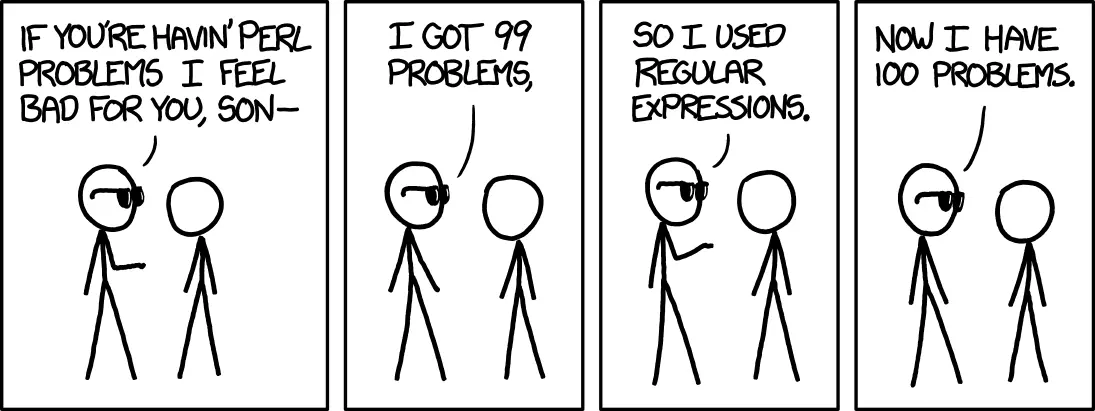^.?$|^(..+?)\1+$
<answer>
Matches strings of any character repeated a non-prime number of times
This is brilliantly disgusting.
Literal interpretation of the regex
The regex matches either a line with a single character or a line with a sequence of two or more characters that’s repeated two or more times. For some examples: the regex matches “a”, “b”, “abab”, “ababab”, “aaaa”, and “bbbbbb”, but does not match “aa”, “bb”, “aaa”, “ab”, “aba”, or “ababa”.
Hint for the special thing it matches
For a line with a single character repeated n times, what does matching (or not matching) this regex say about the number n?
You forgot empty line. Since first part is
^.?$it’s one or zero of any character.
It matches for non-primes and doesn’t match for primes.
I’m going to assume the answer is a magic square attempt that just isn’t very good
All my homies hate regexs. That’s actually the best use case I found for LLMs so far : I just tell it what I want it to match or not match, and it usually spits out a decent one
That sounds…
Easier to get almost right than actually learning the subject.
Much, much harder to get completely right than actually learning the subject.
So yes, basically the archetypal use case for LLMs.
Oooof. I feel like trying to figure out what’s wrong with some regex I didn’t write is much harder than writing it myself personally.
I’ve never had to use it for important stuff tbh. But alongside a regex tester and a sample of the stuff I intend to use it on, I’ve had good results with an incremental approach where I tell the LLM what I want to change with the expression until I’m satisfied
No cookie for me I just tried it in Notepad++ and VS code and it matches lines of one characer (first group I think) or the starting of a line that is an at least 2 characters string repeated twice (second group it seems)
so the second group matches abab
abcabc abcdeabce abcdefabcdefNothing about prime numbers really only first repetition gets a match. Very interesting Honestly I used regex from years and never had to retort to something like this ever. I can only imagine it useful to check for a password complexity to not be repeated strings like I do for sites that I just want in and use a yopmail.com mail to register a fake user.
“at least 2 characters repeated [at least] twice” implies the string’s length is divisible by a number greater than 1.
Yes but the match goes for the first repetition the rest of the string isn’t matched no matter the length, again don’t find anything about prime numbers unless I checked something wrong. There is another guy who got it right it seems.
Just waiting for the oppertunity to hide this in prod.
…either an empty string, a single character, or the same sequence of characters repeated more than once?
A non prime number of times… It looks like the string of characters could repeat number of times because the whole capture group repeats. I don’t see a prime constraint.
The capture group must be the same each time it repeats, so the number of characters stays the same. So X groups of Y characters = string of length X*Y. X and Y can be anything so any string length that can be made by multiplying two numbers-- which is every non-prime string length-- is matched. 0 and 1 are handled specially at the start.
Hot take: You’re shit at coding if you can’t do regex.
Regex should generally be avoided wherever possible.
Yeah but it’s just so tempting… It validates so many inputs so easily…
And misses others you didn’t think about.
Yeah, I’ve found myself wasting quite a lot of time thinking of the ‘perfect regex’ for task X only to realise that I could have avoided doing so by simply taking a different approach.
Regular expressions in general, and automata theory, sure you should know about that. But a specific extended regex language like here? That’s like saying you’re shit at coding if you can’t do <insert arbitrary programming language here>.
Ah yes, spoken like a true elitist asshole
It takes a couple of hours to learn the basics.
And then a few more any time you actually want to use it.
And then double it each time you have to decipher the existing one
Just don’t use regex unless there is really no other way, and when you absolutely have to - frankly, that’s one of the ultra rare occasions I recommend using the AI.
You recommend using AI to produce code you don’t understand?
That I do, yes, because that’s a small chunk of code that - when necessary - would have to be completely remade anyways, not just modified.
That wouldn’t fly during a code review.
That’s your opinion my man
I’m not gonna continue using arguments if all you can respond with is cynicism, apparently I wasn’t wrong about the elitism part
knowing Matt Parker it only matches prime numbers or multiples of e or something.
looks at <ansewer>
Yeah see?
Matt Parker will destroy us all! (https://youtu.be/GyNbLtiAgj4?si=r77Ef7wm9EZ83T6J)
Relevant xkcd:

Syntactically valid Perl
Something like
!“A line with exactly 0 or 1 characters, or a line with a sequence of 1 or 3 or more characters, repeated at least twice”!<
It’s a line with a sequence of two or more characters repeated at least twice.
Only the part after the pipe character. The pipe character works as an “or” operator. RegalPotoo is right.
They said—
A line with exactly 0 or 1 characters, or a line with a sequence of 1 or 3 or more characters, repeated at least twice
Note—
…or a line with a sequence of 1 or 3 or more characters, repeated at least twice
It should be—
…or a line with a sequence of 2 or more characters, repeated at least twice
The regex in the post will match “abab”. Their original description (line 2 of this comment) will not match “abab”.
I agree, you’re right about the part after the pipe and RegalPotoo’s explanation was not entirely correct.
You’re misreading the
..+?part. That means 2 or more characters, non greedy.
For a second I thought I was still in the thread about monkeys face-rolling typewriters until the heat death of the universe not eventually producing Hamlet
Looks like APL to me.
Empty input Or input of exactly 1 character Or input of at least 2 characters, followed by at least 1 something (idk what \1 matches)
Did I get it (almost)?
\1 is group 1 which is inside
(), so second part is repeated 2 or more times of 2 or more char.Interesting.
So that means match any string that is made entirely of a single repeating sequence, where repititon is possible.






